Keeping your teeth healthy is key to avoiding tooth decay. It's a common problem that can affect anyone, at any age. By knowing how to take care of your teeth, you can stop tooth decay before it starts.
Simple steps like brushing your teeth every day and flossing regularly are important. What you eat also matters. Eating the right foods can help keep your teeth strong. Don't forget to see your dentist regularly. They can spot tooth decay early and help fix it.
By following these tips, you can keep your teeth in great shape. This not only makes your smile brighter but also improves your overall health.
Tooth decay, also known as dental caries, is a common problem for people of all ages. It happens when the enamel, the outer layer of the teeth, gets damaged by acids from mouth bacteria. Knowing the tooth decay explanation helps spot it early.
The definition of tooth decay is a process that weakens teeth. Bacteria in the mouth feed on sugars and carbs, making harmful acids. This sugar and bacteria interaction causes enamel erosion. Without treatment, it can lead to serious cavities and tooth damage.
The causes of tooth decay are many. Key factors include:
These factors help bacteria grow, causing tooth damage over time.
Recognizing signs of tooth decay early is crucial. Look out for:
Being alert to these oral health warnings helps get timely treatment and prevent further damage.
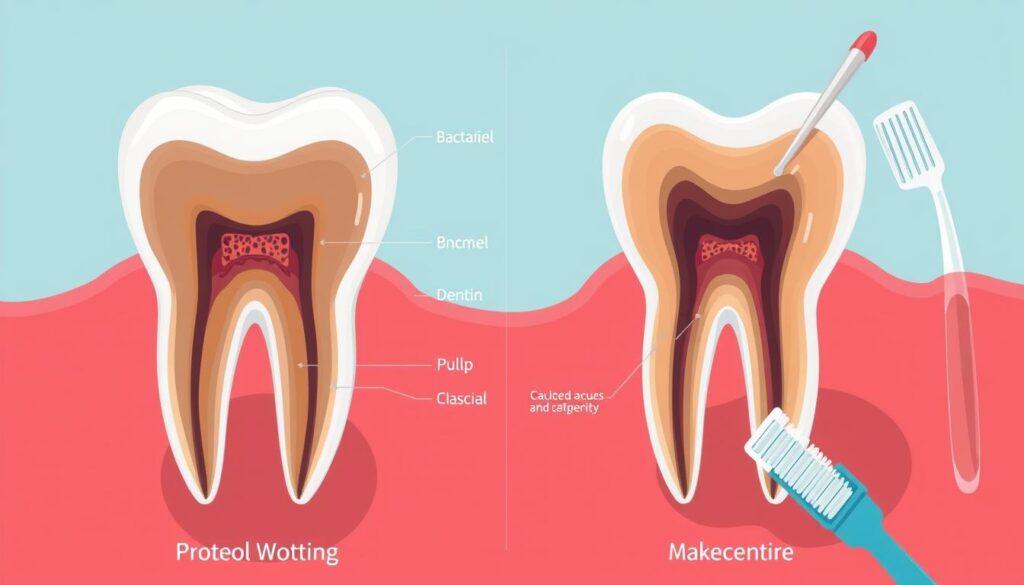
To prevent tooth decay, you need to stick to good oral hygiene habits. A strong dental care routine is key. This includes brushing, flossing, and using mouthwash every day. These steps help control plaque and keep your teeth healthy for a long time.
Here are some daily habits to fight tooth decay:
Regular dental visits are crucial for your teeth. Going to the dentist every six months is important. They can:
Keeping your diet tooth-friendly is key for good dental health. The right foods can greatly improve your oral hygiene and overall health. Adding certain dental health foods to your meals and avoiding bad ones can really help.
Foods full of vitamins and minerals help strengthen your teeth and gums. Some great dental health foods are:
These foods not only protect against tooth decay but also boost your overall health.
To keep your teeth safe, avoid certain unhealthy snacks. Foods and drinks high in sugar and acid can cause big dental problems. Try to limit:
Choosing better options can lower your risk of cavities and other dental issues.
Drinking enough water is crucial for good oral health. Water helps wash away food particles and bacteria that can cause decay. It also helps make saliva, which neutralizes acids and strengthens teeth.
Water should be your main drink. Sugary drinks can harm your teeth and should be used sparingly.

| Food Category | Benefits | Foods to Avoid |
|---|---|---|
| Dairy Products | High in calcium, supports enamel strength | Sticky Candies |
| Leafy Greens | Nutrient-dense, supports gum health | Sodas |
| Crisp Vegetables | Stimulates saliva, cleans teeth | Processed Snacks |
| Nuts and Seeds | Packed with minerals, aids enamel production | Soft Drinks |
To prevent tooth decay, we need to do several things. First, keep up with good oral hygiene like brushing and flossing. Also, choose healthy foods and visit the dentist regularly. This way, we can avoid tooth decay and keep our smiles bright.
Good oral care is very important. We should brush and floss every day and eat right. Doing these things helps our overall health and keeps our teeth strong.
Keeping our teeth healthy is a long-term effort. By sticking to good oral hygiene and eating well, we can stay on track. Regular dentist visits are key. This way, we ensure a healthy smile for years to come.
Tooth decay, also known as dental caries, is a process that damages teeth. It happens when acids from bacteria eat away the enamel, causing cavities.
Tooth decay is mainly caused by bad dental habits, eating too much sugar, dry mouth, and not enough fluoride. Bacteria in plaque eat sugars, making acids that damage the enamel.
Signs of tooth decay include tooth sensitivity, visible holes, toothache, and discoloration. Catching it early is key to treating it well.
To stop tooth decay, brush your teeth twice a day with fluoride toothpaste and floss every day. Also, don't forget to see your dentist regularly for check-ups.
Good daily oral care is brushing your teeth for two minutes, twice a day. Flossing daily, using mouthwash, and changing your toothbrush every three months is also important.
Seeing a dentist every six months is recommended. It helps with preventive care and getting a professional oral health check.
Foods high in calcium, phosphorus, and vitamins A, C, and D are good for your teeth. Examples include dairy, leafy greens, and crunchy veggies.
To avoid tooth decay, eat less sugary foods and drinks like soda and candies. Also, avoid acidic foods and drinks that can harm your enamel.
Drinking water is important for your mouth. It helps clean away food and bacteria. It also helps make saliva, which is good for your teeth.
Smile design is key in cosmetic dentistry, aiming to make smiles look better. It uses many dental methods and techniques for a stunning smile makeover. In Turkey, more people want to feel better about themselves with a beautiful smile.
This process is all about combining art and dental skills. It makes sure the smile looks good and works well.
Understanding the definition of smile design is key for those looking to improve their smile. It involves using cosmetic dentistry techniques to create a beautiful aesthetic smile. Dental experts carefully look at each person's unique features.
Smile design looks at the shape, color, and alignment of teeth. Dental professionals aim to make the smile look good while keeping it functional. They use advanced cosmetic dentistry techniques to match the smile with the face.
The importance of smile design in cosmetic dentistry is huge. A great smile boosts self-esteem and improves life in many ways. It makes people feel better about themselves and their interactions with others.
The aesthetic dentistry significance is in making smiles both beautiful and functional. With new technology, smile makeovers are more successful than ever. This means patients get the smile they want for good.

The smile design process starts with a detailed first meeting. Here, a dentist checks your teeth and talks about what you want your smile to look like. They use advanced tools like photos and models to get a clear picture of your smile goals.
Good communication is key in this step. It lets you share your dream smile with the dentist. This helps them understand what you need.
The dentist begins by talking about your smile concerns and what you want. This first step is important for building trust and understanding. It helps both you and the dentist figure out the best dental solutions for you.
Next, the dentist uses digital tools to create mockups of your future smile. This lets you see what your smile could look like before any work is done. It's a way to make sure you're happy with the plan.
These mockups show how different dental treatments can work together. They help the dentist explain how they will help you achieve your smile goals.
With the insights from the initial meeting and mockups, the dentist creates a personalized plan. This plan includes specific steps to reach your cosmetic goals. It might include whitening, veneers, orthodontics, or gum shaping.
This plan is clear and includes timelines and costs. It helps both you and the dentist feel confident about your journey to a better smile.
Smile Design is a way to make your smile look better. It looks at things like the shape and color of your teeth. It also checks how they fit with your face. Treatments like whitening and restorations are part of it.
Smile Design is key because it makes you feel more confident. A nice smile can change your life. It's important for looking good and feeling good.
It starts with a visit to the dentist. They check your teeth and what you want. They use pictures and models to plan your smile.
Digital imaging is very important. It lets dentists show you what your smile could look like. This helps you talk about what you want before starting.
A plan is made just for you. It includes things like whitening and veneers. It also has a schedule and cost based on what you need.
Smile Design makes your smile look and work better. This boosts your confidence. A good smile can change how you feel and act.
Techniques include whitening and bonding. You might also get veneers or orthodontics. These help make your smile look the way you want.
It depends on what you need. Simple things might take weeks. More complex cases could take months.
Aesthetic dental veneers are becoming more popular in cosmetic dentistry, especially in Turkey. People are looking for the perfect smile makeover. These thin shells, made of porcelain or composite resin, improve the look of teeth. They fix problems like discoloration, chips, gaps, and misalignment.
As more people want better smiles, knowing about the different veneers is key. Each type offers unique benefits for a better look. Exploring aesthetic dental veneers is important for those thinking about this change.
Aesthetic dental veneers are a great way to improve your smile. They are thin, custom-made shells that cover the front of your teeth. They fix many smile issues. Knowing what they're made of helps us understand how they work and last.
Dental veneers are made from porcelain or composite resin. Porcelain ones are strong and look like real teeth. Composite ones are cheaper and can be fixed if they get damaged. They need only a small part of your tooth to work, making them less invasive than crowns.
Dental veneers can really make your smile better. They hide stains, gaps, and uneven teeth. The process is mostly painless. Plus, they don't stain easily, keeping your smile bright for years.
People often feel more confident and happy with their smile after getting veneers. It's a powerful way to change how you look and feel.
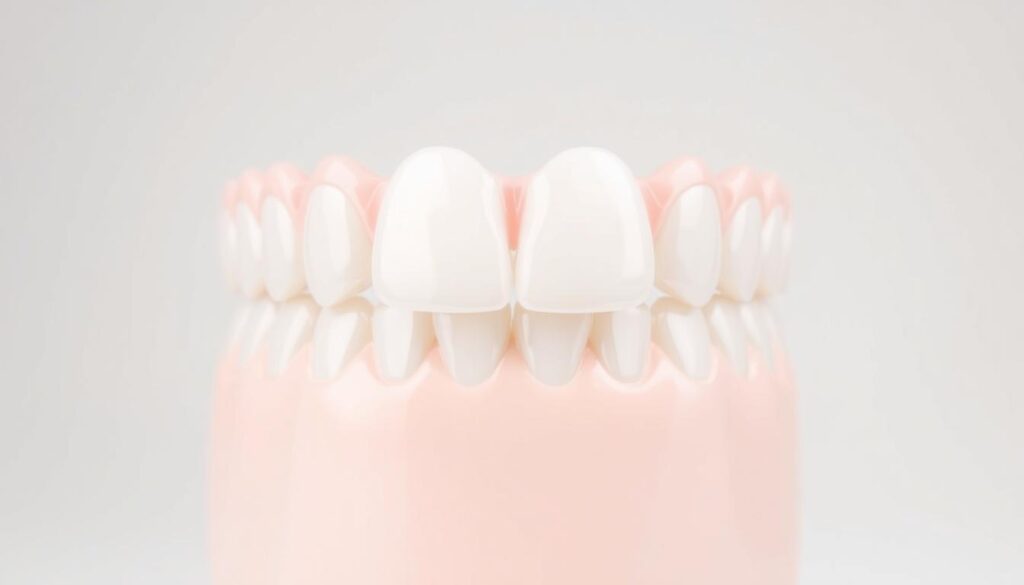
| Aspect | Porcelain Veneers | Composite Resin Veneers |
|---|---|---|
| Material | Porcelain | Composite Resin |
| Durability | Highly Durable | Moderately Durable |
| Appearance | Natural Look | Repairable Look |
| Cost | Higher | Lower |
| Stain Resistance | Excellent | Good |
Aesthetic dental veneers come in different types, each with its own benefits. Knowing these options helps people choose what's best for them.
Porcelain veneers are known for their strength and natural look. They resist stains well, making them a popular choice. The process involves two visits: the first for consultation and preparation, and the second for application.
People often choose them for their durability and natural appearance.
Composite resin veneers are a budget-friendly alternative. They can be applied in one visit, making them convenient. However, they may need more repairs over time due to wear and staining.
They offer customization, fitting each person's needs.
Lumineers are ultra-thin and require little to no tooth preparation. They bond directly to teeth, making the process simpler. This makes them a good option for those who want a less invasive procedure.
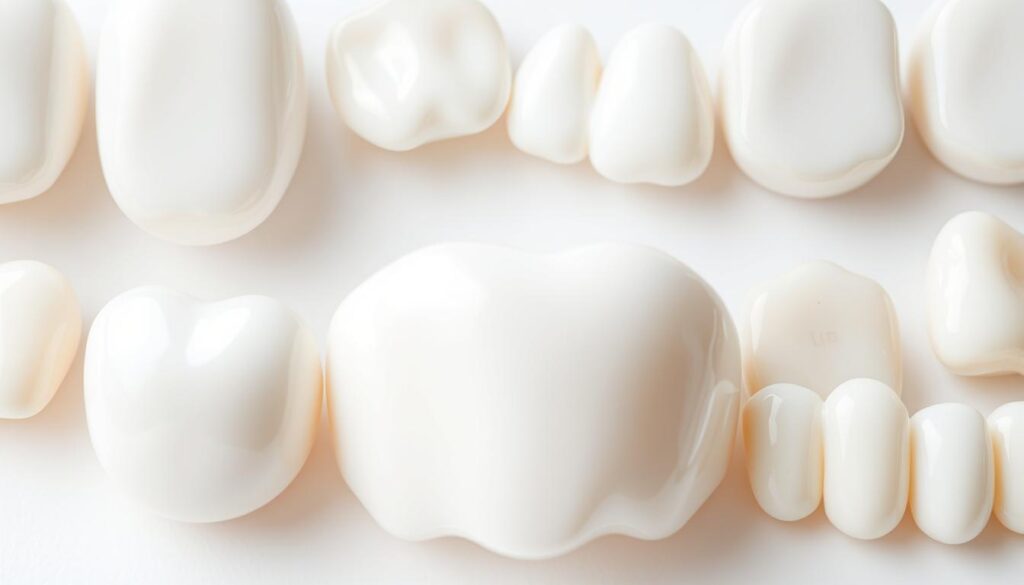
Aesthetic dental veneers are a great way to improve your smile. You can choose from porcelain, composite resin, or Lumineers. Each has its own benefits for different needs and looks.
It's important to talk to dental experts before making a choice. They can help based on your dental health and what you want. Turkey is becoming a popular place for cosmetic dentistry, so knowing the latest options is key.
Getting veneers can change how you feel about yourself. It's not just about looks; it's about feeling better. Look into your options to find the best fit for your dream smile.
Aesthetic dental veneers are thin, custom-made shells. They are made of porcelain or composite resin. They fit over the front of teeth to improve their look. They can fix issues like discoloration, chips, and gaps.
Dental veneers' lifespan varies. Porcelain veneers can last 10 to 15 years. Composite resin veneers might last 5 to 7 years. This depends on how well you care for your teeth and your lifestyle.
Composite resin veneers are cheaper and can be done in one visit. But, they stain easily. They might need to be replaced more often than porcelain veneers.
Porcelain veneers can greatly improve your smile. They cover up imperfections like misalignment or discoloration. This creates a polished, natural look that boosts your confidence and self-esteem.
Yes, Lumineers are very thin and bonded in a way that makes them removable. This means they can be taken off without harming your teeth, making them a reversible choice.
Think about durability, cost, aesthetics, and how they affect your teeth when choosing veneers. Talking to a dentist can help you make a decision that's right for you.
Yes, dental veneers can close gaps between teeth. They make your smile look more uniform and reduce the appearance of misalignments.
Getting aesthetic dental veneers usually takes two visits. First, you'll have a consultation and tooth preparation. Then, the veneers are placed to ensure a perfect fit and look.
Dental veneers are usually made of porcelain or composite resin. Porcelain is durable and resistant to stains. Composite resin is more affordable but less durable.
Pediatric dentistry is crucial for kids' oral health from birth to teens. It focuses on both treatment and prevention. This helps kids in Turkey develop good dental habits for life.
Regular dental visits and learning about healthy habits are key. They help prevent dental problems. Taking your child to a pediatric dentist can make dental care positive and fun.
Pediatric dentistry is key for kids' oral health. It helps parents teach their children good dental habits. This is crucial for a child's health and growth.
Teaching kids about dental care early is vital. They need to know how to brush their teeth right. Pediatric dentists say to start these lessons early and show kids how to use fluoride.
Make these habits a part of their daily routine. This shows how important pediatric dentistry is in taking care of kids.
Preventive dental care is a must. It helps catch problems early. Kids should see a dentist by their first birthday.
Services like sealants and fluoride treatments help keep teeth healthy. They lower the chance of dental problems later. This care boosts a child's confidence and health.

Children's dental visits should be positive to shape their oral health views. Pediatric dentists aim to make dental visits fun. They create a friendly environment that helps kids relax.
Dentists use bright colors, friendly staff, and fun activities for kids. These make dental visits less scary. Kids learn to value dental care in a happy place.
Pediatric dentists do cleanings, fillings, and more for kids. They explain each procedure to make kids feel at ease. This helps kids understand what's happening.
It's key to manage kids' anxiety at the dentist. Dentists use talking, distractions, and a calm space. Parents' involvement makes kids feel safer.
Finding the right pediatric dentist is key for your child's teeth health. Look for dentists with the right credentials and specialties for kids. Knowing their qualifications helps parents choose the best for their child's dental care.
Choose dentists who are board-certified and have special training for kids. They know how to handle treatments and issues specific to children. Ask other parents, check online reviews, and visit for a consultation to see who's best.
A friendly and caring dentist's office is important for kids. A dentist who is good with kids can make visits less scary. Studies show kids who have good dental experiences are more likely to keep up with dental care.

Pediatric dentistry is key for kids' dental health. It offers services made just for young patients. This helps parents see why early dental care is important.
It's all about preventing problems before they start. This way, kids can have healthy smiles forever.
Pediatric dental offices make visits fun and welcoming. This makes kids feel at ease. Choosing a good pediatric dentist in Turkey is crucial.
It ensures kids get the care they need. This helps them feel confident about their dental health.
Regular dental visits are important. They help kids take care of their teeth. This sets them up for a lifetime of good oral health.
By focusing on kids' dental health, families can create lasting habits. These habits lead to bright, healthy smiles for years to come.
Pediatric dentistry focuses on kids' teeth from birth to when they're teenagers. It aims to prevent and treat dental problems. This helps kids have healthy teeth for life.
Early dental visits help kids develop good oral habits. The American Academy of Pediatric Dentistry suggests a first visit by age one. This helps catch dental problems early.
At a pediatric dental visit, kids are in a fun, welcoming place. They get a cleaning and check-up. The dentist might do special procedures for kids.
Talk to your child about the dentist visit to ease their worries. Use fun distractions and make the place cozy. Teaching them about the visit can also help.
Look for a pediatric dentist who is board certified. They should have lots of experience with kids. This ensures they meet children's dental needs.
A good dental visit can make kids more open to dental care. Studies show kids who have positive dental experiences tend to take better care of their teeth as adults.
Yes, services like sealants and fluoride treatments are key. They help prevent cavities and keep teeth healthy. This keeps your child's smile bright as they grow.
The cost of dental braces can vary a lot. In Turkey, braces cost between $1,000 and $3,000. This is cheaper than in Western countries. It's important to know what affects the cost, like consultation fees and the type of braces.
There are different types of braces, like metal, ceramic, and clear aligners. Each has its own price. Knowing this helps patients understand what to expect in Turkey.
Many things affect how much dental braces cost. Each factor changes based on personal needs and choices.
The types of braces you choose can really change the price. You can pick from:
Each type has its own price and meets different needs.
Treatment duration also affects the cost. Longer treatments mean more money. Braces can last from 6 months to 2 years, depending on the problem.
The orthodontist location and the dentist's reputation matter a lot. Cities usually cost more because of demand and higher costs. But, rural areas might be cheaper, making it easier to get treatment.
| Type of Braces | Average Cost (USD) | Treatment Duration (Months) |
|---|---|---|
| Traditional Metal | 2,000 - 6,000 | 12 - 24 |
| Ceramic | 2,500 - 8,000 | 12 - 24 |
| Lingual | 5,000 - 13,000 | 18 - 36 |
| Clear Aligners | 3,000 - 8,000 | 6 - 18 |
Knowing these factors helps you make better choices about braces. It lets you plan based on your own situation.
Many people look to Turkey for affordable dental braces. Turkey offers quality care at a lower cost. This section will look at prices in cities and towns, and how insurance and financing can help.
Prices for braces vary a lot between cities and towns. In big cities like Istanbul, braces can cost between $2,000 and $3,500. But, in smaller towns, you might pay between $1,000 and $2,500 for the same treatment.
| Area Type | Average Cost |
|---|---|
| Urban (e.g., Istanbul) | $2,000 - $3,500 |
| Rural (e.g., smaller towns) | $1,000 - $2,500 |
Dealing with the cost of braces can be tricky. Some people use dental insurance in Turkey to help pay for treatment. Not all insurance covers braces well, so it's important to check your plan. Dental clinics also offer payment plans to make treatment more affordable.

Looking for affordable braces is key for many. There are ways to make orthodontic treatment more budget-friendly. By looking into payment plans and financing, and comparing clear aligners to traditional braces, you can choose wisely. Also, dental clinics in Turkey often have special deals and discounts, making quality care more accessible.
Dental clinics provide flexible payment plans. This lets families spread out the cost of braces over time. Options include:
Choosing between clear aligners and traditional braces depends on several factors. Clear aligners are a discreet option, great for adults and teens. Here's a comparison:
| Feature | Clear Aligners | Traditional Braces |
|---|---|---|
| Visibility | Almost invisible | Metal or ceramic visible on teeth |
| Comfort | Less discomfort | Some discomfort during adjustments |
| Cost | Generally higher than traditional |
More affordable in some cases |
In Turkey, dental clinics offer many promotions and discounts. Look out for seasonal deals, referral discounts, and package deals. These offers can significantly reduce the cost of dental care. Taking advantage of these can save you a lot of money.
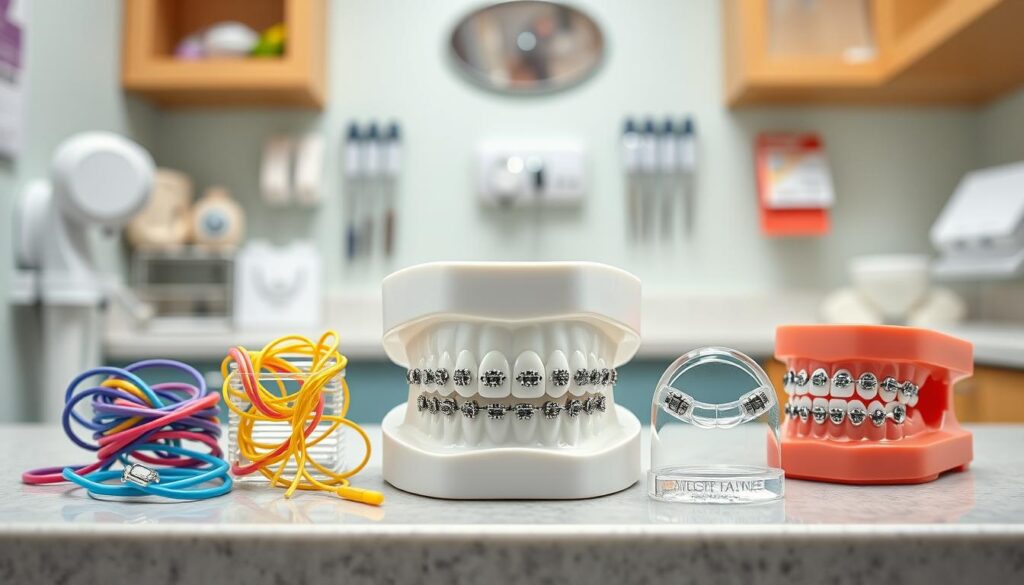
Dental braces in Turkey cost differently, based on the type, treatment length, and where you are. Knowing this helps you make smart choices about orthodontic care. The factors we talked about are key to understanding the costs.
There are also ways to make braces more affordable in Turkey. You can look into payment plans and discounts from dental clinics. This helps you stay within your budget while getting the treatment you need. Planning ahead can help you get the smile you want without breaking the bank.
This article has given you important tips on orthodontic care. Remembering the costs can help you make better choices. This way, you can work towards a healthier, brighter smile.
Dental braces in Turkey cost between
Dental braces in Turkey cost between $1,000 and $3,000. This is cheaper than in Western countries. Prices vary based on the type of braces and where you are in Turkey.
Several things affect braces prices. These include the type of braces, how long treatment takes, and where you get it. The complexity of your dental issues also plays a role.
Yes, many clinics in Turkey offer payment plans for braces. This helps spread out the cost over time. It makes getting braces more affordable for those on a budget.
In cities like Istanbul, braces cost between $2,000 and $3,500. Rural areas charge between $1,000 and $2,500. Prices vary due to demand and operational costs in each area.
Yes, many dental insurance plans in Turkey cover orthodontic treatments. It's important to check your policy to see what's covered.
Clear aligners are a cheaper option. They are less noticeable and more comfortable for some. Clinics also offer promotions and discounts to lower treatment costs.
Many clinics in Turkey have seasonal promotions or special packages. These include discounts on braces. It's a good idea to ask about current offers when considering braces.
,000 and ,000. This is cheaper than in Western countries. Prices vary based on the type of braces and where you are in Turkey.
Several things affect braces prices. These include the type of braces, how long treatment takes, and where you get it. The complexity of your dental issues also plays a role.
Yes, many clinics in Turkey offer payment plans for braces. This helps spread out the cost over time. It makes getting braces more affordable for those on a budget.
In cities like Istanbul, braces cost between ,000 and ,500. Rural areas charge between
Dental braces in Turkey cost between $1,000 and $3,000. This is cheaper than in Western countries. Prices vary based on the type of braces and where you are in Turkey.
Several things affect braces prices. These include the type of braces, how long treatment takes, and where you get it. The complexity of your dental issues also plays a role.
Yes, many clinics in Turkey offer payment plans for braces. This helps spread out the cost over time. It makes getting braces more affordable for those on a budget.
In cities like Istanbul, braces cost between $2,000 and $3,500. Rural areas charge between $1,000 and $2,500. Prices vary due to demand and operational costs in each area.
Yes, many dental insurance plans in Turkey cover orthodontic treatments. It's important to check your policy to see what's covered.
Clear aligners are a cheaper option. They are less noticeable and more comfortable for some. Clinics also offer promotions and discounts to lower treatment costs.
Many clinics in Turkey have seasonal promotions or special packages. These include discounts on braces. It's a good idea to ask about current offers when considering braces.
,000 and ,500. Prices vary due to demand and operational costs in each area.
Yes, many dental insurance plans in Turkey cover orthodontic treatments. It's important to check your policy to see what's covered.
Clear aligners are a cheaper option. They are less noticeable and more comfortable for some. Clinics also offer promotions and discounts to lower treatment costs.
Many clinics in Turkey have seasonal promotions or special packages. These include discounts on braces. It's a good idea to ask about current offers when considering braces.
Full dentures and partial dentures are key dental prosthetics. They help restore function and look for those who've lost teeth. These solutions not only improve oral health but also boost confidence. This article explores full and partial dentures, including their features, who they're for, and their benefits.
By learning about these options, people looking to replace teeth can make smart choices. These choices should match their specific needs.
Full dentures are removable dental prosthetics that replace an entire arch of missing teeth. Knowing what full dentures are is key for those looking into them. This part will cover what they are, who needs them, and their benefits.
Full dentures have a gum-colored base made of acrylic resin. They look natural and help those without teeth chew and smile again.
People who lose all their teeth might need full dentures. This can happen due to tooth decay, gum disease, accidents, or other dental issues. Many older adults find them helpful because they often lose teeth as they age.
Full dentures offer many benefits, including:
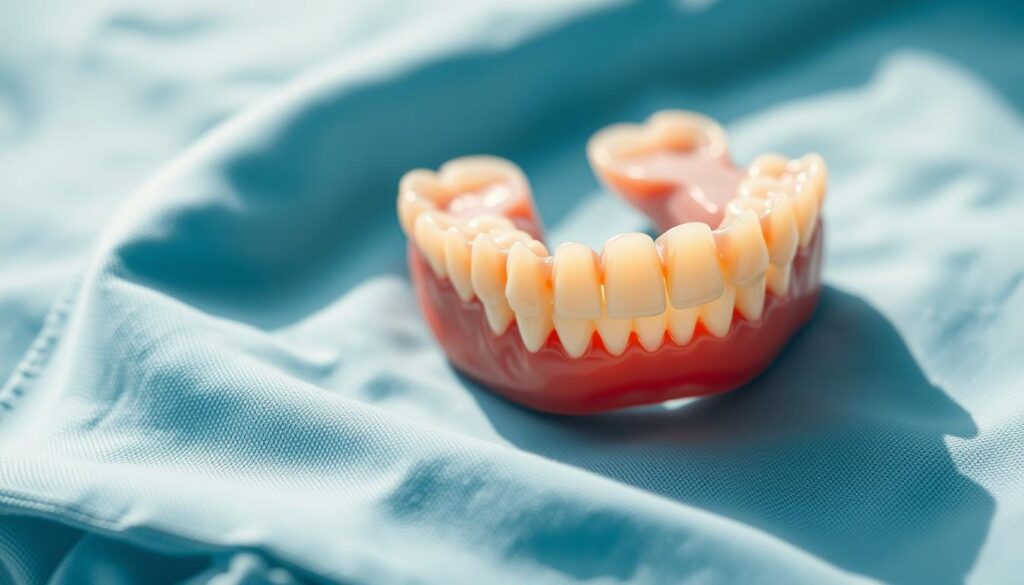
Partial dentures are key in fixing missing teeth. They help those with gaps in their smile. Knowing how they work and their benefits is important for making the right choice. These dentures fill in missing teeth with a metal or acrylic base.
They are designed to hold replacement teeth in place. This section will cover what partial dentures are, who they're for, and their advantages.
Partial dentures are dental aids that fit with your natural teeth. They're different from full dentures, which replace all teeth. Partial dentures help you chew better and make your smile look fuller.
Who gets partial dentures depends on their teeth and oral health. Adults with missing teeth due to decay, injury, or gum disease are good candidates. They also help those with spaces between their teeth.
Partial dentures offer many benefits. They improve chewing and look good. They also stop other teeth from moving, which can cause problems. They're cheaper and easier to get than dental bridges.
Knowing the differences between full and partial dentures is key. It helps you make better choices for your teeth and life. We'll look at the main differences and offer tips on picking the right one for you.
Full dentures replace all teeth, while partials fill in gaps. The main differences are:
Choosing between full and partial dentures depends on your dental health and lifestyle. Consider these factors:
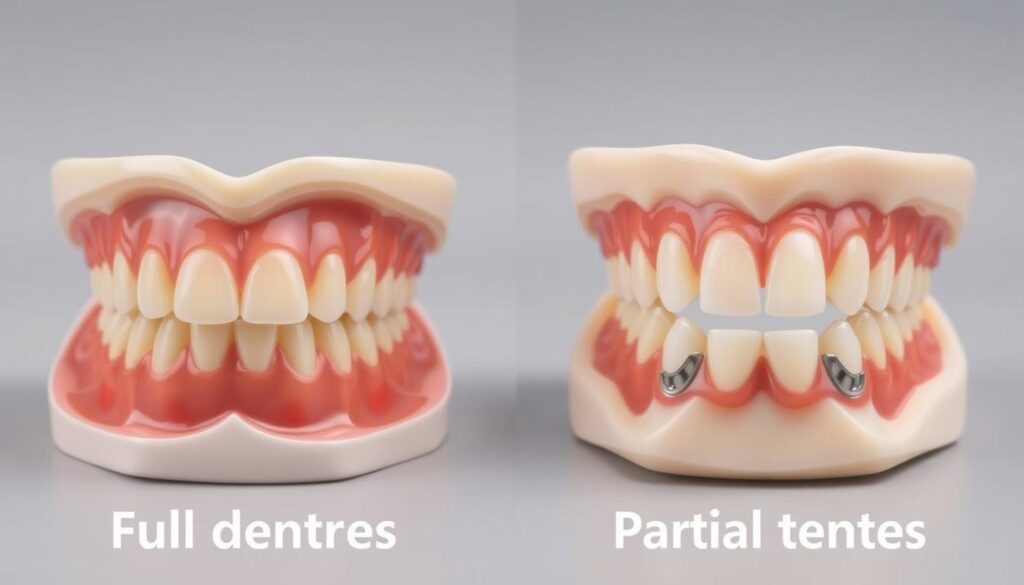
Understanding full and partial dentures is crucial for those looking into these options. Each type has its own benefits and fits different needs. Knowing these differences helps you make better choices for your oral health.
Talking to dental experts is important. They can give you personalized advice based on your dental needs. This way, you can find the best solution to restore your smile.
Choosing between full or partial dentures is a big decision. But knowing a lot about dental solutions is key to good oral health. Get informed and ask for professional advice to make the right choice for your smile.
Full dentures replace all teeth in an arch. Partial dentures are for those with some teeth left. They also differ in materials and how they stay in place.
Getting used to full dentures takes time. It can be a few weeks to a couple of months. You might feel sore and adjust your speech at first, but it gets better.
Yes, eating with partial dentures is normal after adjusting. Start with soft foods and add harder ones later. Make sure they fit right and follow your dentist's advice.
Both need regular cleaning. Brush them with a denture brush and soak in denture cleaner. Remove them at night to rest your gums and keep the dentures in shape.
No strict diet rules, but avoid hard, chewy, or sticky foods. They can harm your dentures. Talk to your dentist for specific advice.
You might need dentures if you've lost many teeth, have trouble chewing or speaking, or notice your oral health getting worse. A dentist can assess your needs.
Prices vary by materials, dental work complexity, and location. Full dentures cost between
Full dentures replace all teeth in an arch. Partial dentures are for those with some teeth left. They also differ in materials and how they stay in place.
Getting used to full dentures takes time. It can be a few weeks to a couple of months. You might feel sore and adjust your speech at first, but it gets better.
Yes, eating with partial dentures is normal after adjusting. Start with soft foods and add harder ones later. Make sure they fit right and follow your dentist's advice.
Both need regular cleaning. Brush them with a denture brush and soak in denture cleaner. Remove them at night to rest your gums and keep the dentures in shape.
No strict diet rules, but avoid hard, chewy, or sticky foods. They can harm your dentures. Talk to your dentist for specific advice.
You might need dentures if you've lost many teeth, have trouble chewing or speaking, or notice your oral health getting worse. A dentist can assess your needs.
Prices vary by materials, dental work complexity, and location. Full dentures cost between $1,000 and $3,000. Partial dentures are usually cheaper. Talk to your dentist for a precise quote.
Yes, you can get immediate dentures after tooth extraction. They help while your gums heal. But, you might need adjustments as your mouth heals.
,000 and ,000. Partial dentures are usually cheaper. Talk to your dentist for a precise quote.
Yes, you can get immediate dentures after tooth extraction. They help while your gums heal. But, you might need adjustments as your mouth heals.
Composite fillings have become very popular for fixing teeth. They look better than old fillings and work well too. They stick to your teeth, making them stronger and helping keep your mouth healthy.
The American Dental Association says these fillings are great for fixing cavities and chipped teeth. Dental offices in Turkey and around the world are using them more. This shows how good they are for making teeth look better.
Composite fillings are a top pick for those looking for dental fixes. They stand out because of their natural appearance and how well they blend with teeth.
Composite fillings are made to look just like real teeth. This means your smile can look better without the metal look of old fillings. People love how these fillings make them feel more confident about their teeth.
Composite fillings are known for color customization. Dentists pick the right shade to match your teeth. This ensures a natural look that makes you happy with the results.
Composite fillings are great at tooth blending. They blend so well with your teeth that you can't even see them. This makes your smile look better and keeps your teeth healthy.
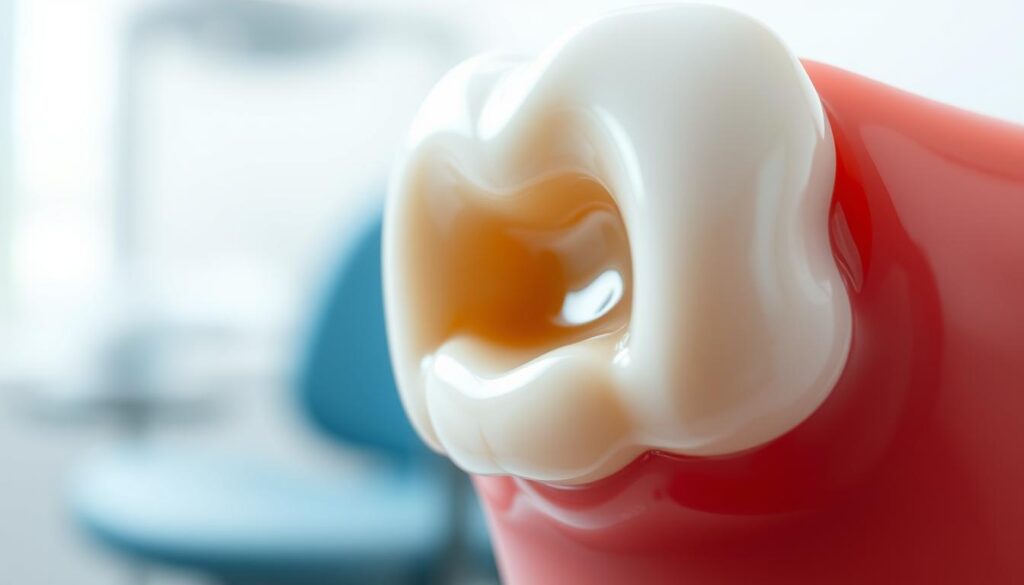
| Feature | Composite Fillings | Traditional Fillings |
|---|---|---|
| Aesthetic Appeal | High, closely mimics natural teeth | Limited, may be noticeable |
| Color Customization | Available, matches existing teeth | Not available, usually silver or gold |
| Tooth Blending | Excellent, seamless integration | Poor, may contrast with natural enamel |
Composite fillings are popular for good reasons. They last long and don't stain easily. Knowing these points helps patients choose the best option for their teeth.
Composite fillings are tough and can handle daily chewing well. They rarely need to be replaced. This makes them a reliable choice for keeping your teeth healthy over time.
Composite fillings also don't stain easily. This is great for those who want their teeth to look good. They stay white even when you eat or drink things that can stain. Their lasting look and feel make them a top pick for fixing teeth.
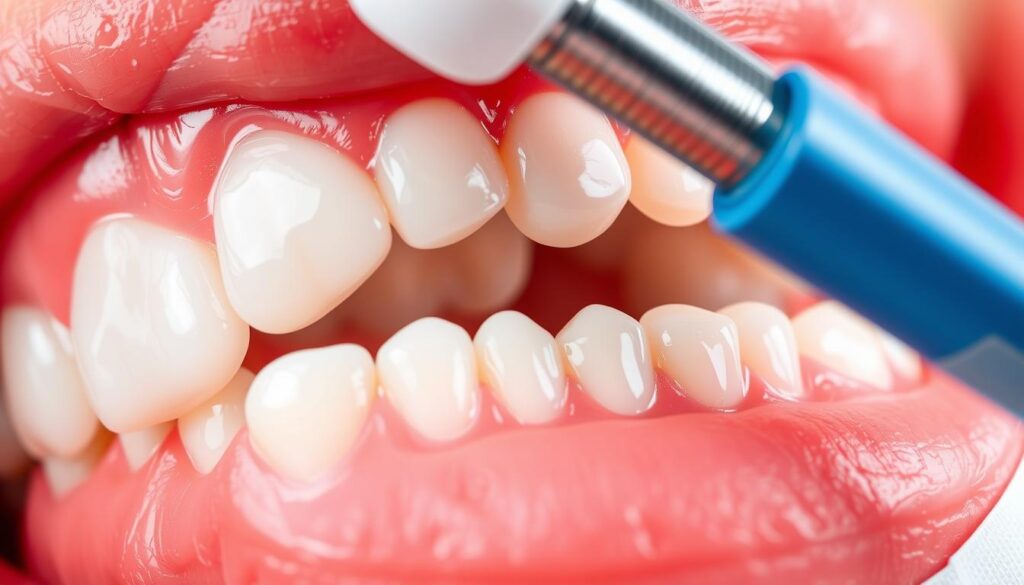
Composite fillings have many advantages, making them a top choice in dentistry. They improve dental health by bonding well to teeth. They also look natural and can be customized for each patient.
These fillings are not just good-looking; they last long and don't stain easily. This is important for dentists and patients in Turkey. It helps ensure the fillings work well and look good for a long time.
In short, knowing the benefits of composite fillings helps make better dental choices. They fix teeth and make them look better. This makes them a great choice for a healthier, brighter smile.
Composite fillings are made from a resin material that looks like real teeth. They fix cavities, chipped teeth, and other issues. They look good and work well.
Composite fillings look better and bond better to teeth. They are less noticeable than old fillings. They also help your mouth stay healthy.
With good care, composite fillings can last 5 to 15 years. How long they last depends on your mouth care and dental visits.
Composite fillings resist staining but can change color over time. Keeping your teeth clean helps them stay looking good.
Yes, composite fillings can be colored to match your teeth. Your dentist can pick a shade that blends with your natural teeth.
Yes, composite fillings strengthen your tooth. They bond well to the tooth, helping keep your mouth healthy and preventing more damage.
First, the dentist numbs the area. Then, they remove decay and apply the filling in layers. The filling is cured, shaped, and polished to fit your tooth.
In Turkey, the quest for a whiter smile is on the rise. This shows how much people value looks and self-care. Social interactions often depend on how we look, so many are looking for ways to brighten their smiles.
The Turkish Dental Association notes a big jump in dental services offering whitening treatments. There's also a growing interest in whitening products you can use at home. Stains from food, drinks, and lifestyle choices can dull our smiles. It's important to know the different ways to whiten teeth.
Clinics like Turkeyana Clinic offer insights into these options. They help patients find the right balance between looking good and keeping their teeth healthy in Turkey.
There are many ways to whiten your teeth, each suited to different needs. You can choose from professional teeth whitening, at-home whitening, or over-the-counter products. Each option has its own benefits and things to consider, helping you find what works best for you.
Professional teeth whitening is the most effective, done in dental clinics in Turkey. Skilled dentists use strong bleaching agents for quick results. The main advantages are:
At-home whitening is a convenient option for those who prefer to do it themselves. It uses custom trays or strips, available from dental clinics or online. The benefits are:
Over-the-counter whitening products are easy to find and use. They include toothpaste, strips, gels, and pens. The effectiveness varies, so consider the following:
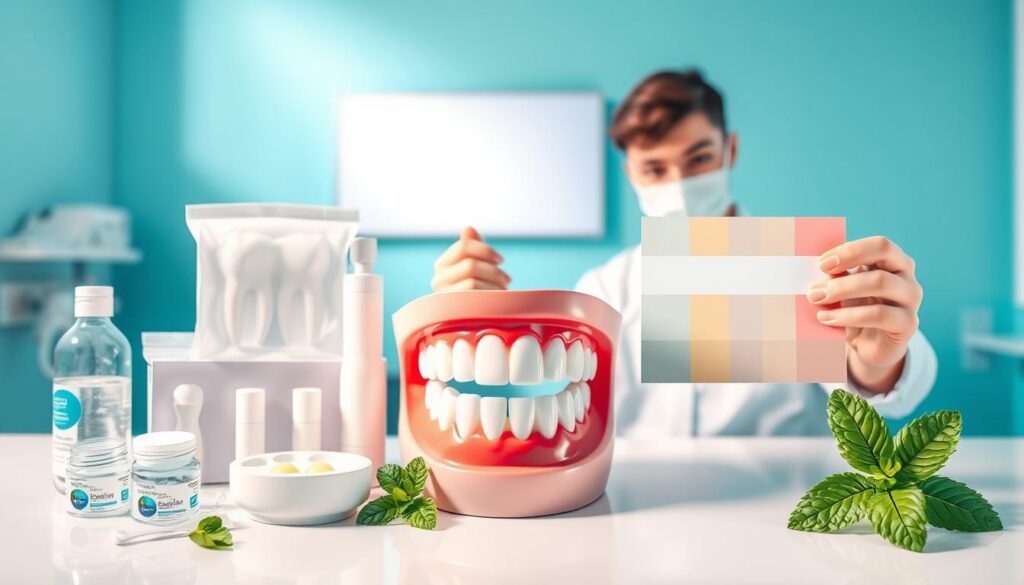
Choosing the right teeth whitening method depends on your needs and dental health. Knowing the differences between professional, at-home, and over-the-counter options helps you make the best choice for your smile.
| Method | Effectiveness | Cost | Time for Results |
|---|---|---|---|
| Professional Teeth Whitening | High | Higher range | Single session |
| At-Home Whitening | Moderate | Moderate range | Several days to weeks |
| Over-the-Counter Products | Variable | Lower range | Weeks |
Choosing the right teeth whitening method is key to a brighter smile. Knowing what you need helps you pick from many options. This part talks about what to think about when picking a whitening method and clears up common myths.
In Turkey, there are many ways to whiten your teeth. Each one suits different tastes and needs:
Knowing what each method does helps you make a smart choice. Think about how sensitive your teeth are and how white you want them to be. This helps pick the best whitening method for you.
Many myths about teeth whitening confuse people. Here are some common ones:
Knowing these myths helps you have realistic hopes for whitening. It leads to safer and more effective whitening.
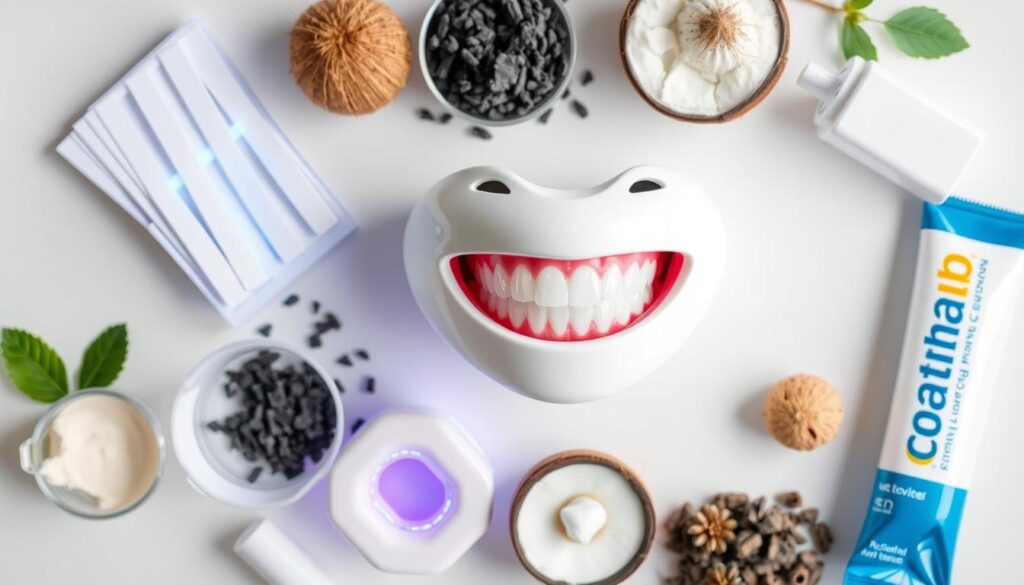
Teeth whitening does more than make your smile brighter. It boosts your confidence and self-esteem. When looking to get a whiter smile in Turkey, it's key to make informed choices. This includes professional treatments, home kits, or over-the-counter products.
Turkey is known for its top-notch dental care, including teeth whitening. Experienced dentists there help you find the best treatment. This ensures your smile is not only bright but also healthy for the long term.
Getting a brighter smile can really change your life. It's important to pick methods that are both beautiful and healthy. Remember, your choices in teeth whitening are crucial for lasting results.
Teeth whitening is a way to make your teeth brighter. It removes stains and discoloration. You can get it done at a dental clinic or at home.
Professional treatments use strong bleaching agents. These agents, like hydrogen peroxide, go deep into the enamel. This makes your teeth lighter. You get these treatments at a dental clinic for quick results.
Yes, at-home solutions are safe if you follow the directions. Products like strips and gels can brighten your smile. But, always talk to a dentist first to avoid any harm.
Some think whitening is bad for teeth or doesn't work fast. But, when done right, it's safe and can work well. Results depend on the method and your teeth's color before treatment.
Results last based on how you take care of your teeth and what whitening method you use. Professional treatments can last longer, sometimes years. At-home treatments might need more frequent use.
Most people can get their teeth whitened. But, those with gum disease or sensitive teeth should talk to a dentist first. A dentist can suggest the best option for you.
Keep your smile bright by brushing and flossing often. Avoid foods that stain teeth, like coffee. Also, get touch-up treatments as your dentist advises.
Fluoride application is key for keeping teeth healthy and strong. It helps prevent cavities and strengthens tooth enamel. This is crucial for good oral care.
Studies from the American Dental Association show fluoride's effectiveness. The World Health Organization also sees fluoride as a major tool against tooth decay. Knowing about fluoride's benefits helps people in Turkey make better choices for their teeth.
Fluoride is key to keeping teeth healthy. It does more than just make teeth strong. Knowing how fluoride works is important for good dental health.
Fluoride is a mineral found in water, soil, and some foods. It helps make tooth enamel stronger. You can get fluoride from fluoridated water, toothpaste, and dental treatments.
Using fluoride daily helps protect your teeth. It makes your enamel stronger against tooth decay.
Studies show fluoride is great for preventing tooth decay. It helps make enamel stronger against acid attacks. This is thanks to fluoride's role in tooth structure and protection against bacteria.
Fluoride is especially important for kids as their teeth grow. Dentists say fluoride is crucial for keeping teeth healthy and preventing cavities.
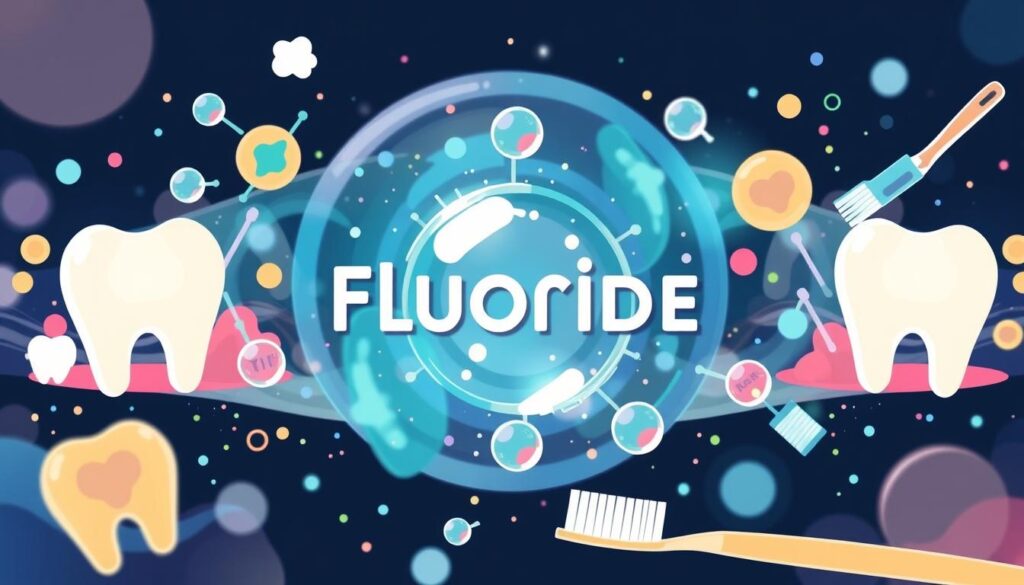
Fluoride application is key in modern dental care. It boosts oral hygiene and dental health. It helps prevent common dental problems like weak tooth enamel, cavities, and acid erosion.
Fluoride makes tooth enamel stronger. Enamel protects teeth and keeps them healthy. Fluoride helps enamel grow harder, making teeth less likely to decay.
This means teeth can fight off decay and other threats better.
Fluoride helps prevent cavities and tooth decay. The Centers for Disease Control and Prevention say it cuts cavity rates by 25% in kids and adults. Fluoride creates a shield against acid from bacteria, lowering cavity risk.
This is especially good for people at high risk of cavities. Dentists recommend it as a key part of cavity prevention.
Acidic foods and drinks can harm teeth. Fluoride helps prevent this by making enamel stronger. Studies show fluoride keeps teeth strong against acid attacks.
This is very important in places like Turkey, where diet affects dental health a lot.
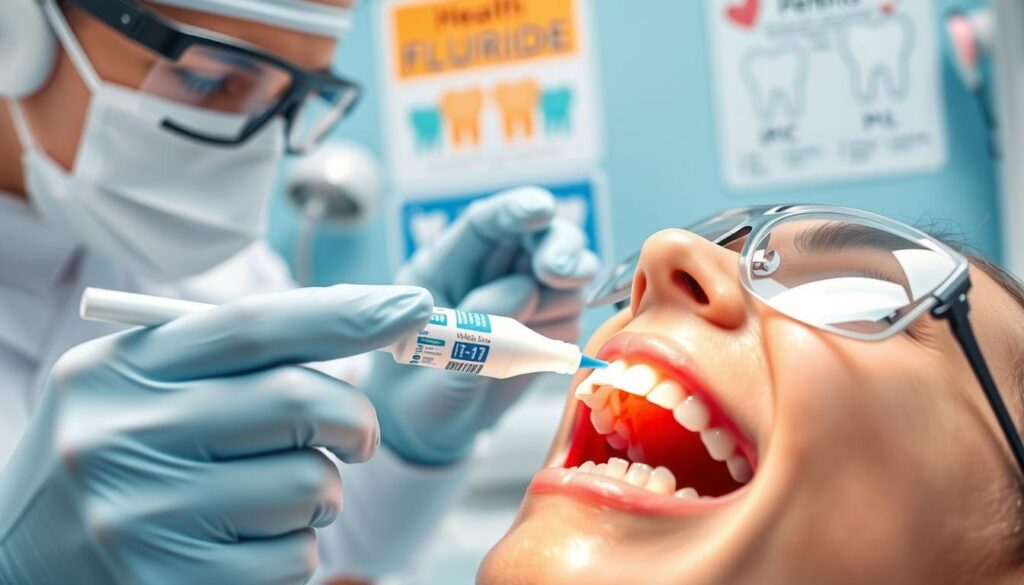
Fluoride is key for strong teeth and good dental health. Using fluoride daily helps make teeth stronger. It also fights cavities and tooth decay, showing how important it is.
Fluoride also protects teeth from acid damage, which is common today. To fight this, we need good oral care plans. These plans should include visits to the dentist. This way, we get advice on using fluoride right for our diet and where we live.
By making fluoride a part of our oral care, we can greatly improve our teeth's health. This leads to a healthier smile and less chance of dental issues.
Fluoride treatment is a dental procedure that uses fluoride to strengthen teeth. It helps prevent cavities and decay. Fluoride makes teeth more resistant to acid and reduces the chance of cavities.
Fluoride makes tooth enamel stronger by helping it remineralize. When fluoride touches teeth, it replaces lost minerals. This rebuilds the enamel, making teeth more resistant to decay.
Too much fluoride can cause fluorosis, which changes how teeth look. It's important to use fluoride as your dentist suggests. This way, you get the benefits without the risks.
How often you need fluoride treatments depends on your risk for cavities. Usually, you should get them every six to twelve months. This is especially true if you're at high risk for cavities.
Yes, fluoride is in many oral care products like toothpaste and mouth rinses. Also, many water supplies are fluoridated. This gives you fluoride all the time for better oral health.
Using fluoride long-term can greatly reduce cavity risk and improve dental health. It prevents serious dental problems and keeps teeth healthy. Regular fluoride use is key to good oral care.
Yes, fluoride is very important for kids' teeth. It strengthens enamel and protects against cavities. This makes it a key part of kids' dental care.
Gum disease, also known as periodontal disease, is a common problem worldwide. It's important to know how to treat it to keep your mouth and body healthy. If ignored, it can cause tooth loss and other health problems. This article will cover different ways to treat gum disease and why keeping your gums healthy is key.
We'll also share tips on preventing gum disease that you can use every day. These tips will help you take care of your gums and teeth.
Gum disease, also known as periodontal disease, is an inflammation and infection of the tissues that support the teeth. It has two main types: gingivitis and periodontitis. Knowing what gum disease is is key, as it mainly comes from plaque buildup due to poor oral hygiene. If you ignore the early signs, it can lead to tooth loss and other health problems.
The definition of gum disease focuses on its effect on oral health. Gingivitis is the mild stage, showing as swollen and red gums. If not treated, it can turn into periodontitis, a more serious form that harms the teeth's supporting structures.
Many things can lead to gum disease. Not brushing or flossing well lets plaque build up, causing inflammation. Smoking and bad diet choices also make you more at risk. Genetics also plays a big part; some people are more likely to get gum problems, even with good oral care. Other risk factors for gum disease include:
Knowing the symptoms of gum disease is crucial for catching it early. Common signs of gum disease are:
Spotting these oral symptoms helps you get help quickly. This can improve gum disease prevention and treatment.
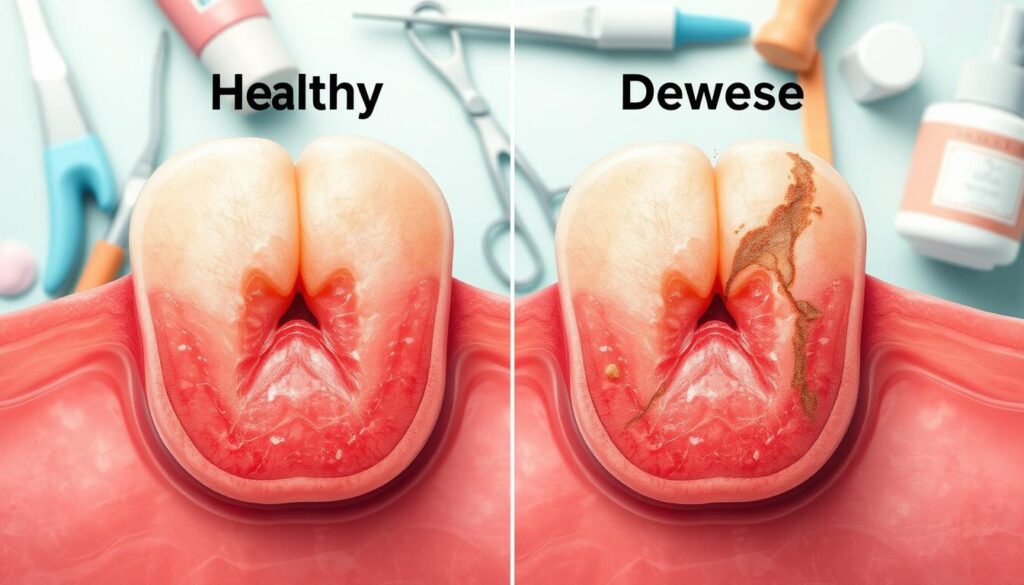
Treating gum disease needs a mix of professional help and home care. Knowing these steps is key to keeping your mouth healthy and avoiding more problems. Here are the main ways to fight gum disease.
If you have gum disease, getting professional help is a must. Regular dental cleanings remove plaque and tartar. Scaling and root planing clean deep around your teeth's roots. This stops the disease from getting worse and is best for early stages.
For more serious cases, surgery might be needed. It helps fix gum health and keeps your teeth in place.
There are also home remedies that can help with gum disease. Saltwater rinses can reduce swelling, and herbal mouthwashes fight bacteria. Essential oils, like tea tree oil, are great for gum health.
Using these remedies regularly, along with professional care, makes treatment more effective.
Good oral hygiene is crucial in treating and stopping gum disease. Important habits include:
Sticking to a regular oral health routine is essential for healthy gums and preventing disease.

| Treatment Type | Description | Frequency |
|---|---|---|
| Dental Cleanings | Professional removal of plaque and tartar buildup. | Every 6 months |
| Scaling and Root Planing | Deep cleaning of tooth roots to remove disease-causing bacteria. | As needed |
| Home Remedies | Use of saltwater rinses and essential oils to soothe gums. | Daily |
| Oral Hygiene Maintenance | Brushing and flossing to prevent plaque accumulation. | Twice daily |
Preventing gum disease starts with good daily dental care and smart food choices. A good oral care routine helps avoid gum inflammation and other problems. Also, eating the right foods is key to keeping gums and teeth healthy.
Having a regular dental care routine is vital for gum health. Important steps include:
This routine not only keeps your teeth clean but also helps your gums stay healthy.
Eating a balanced diet is important for gum health. Here are some tips:
By focusing on nutrition and daily habits, you can easily keep your gums healthy and your mouth in top shape.
Addressing gum disease is key to good oral health. This article covered gum disease's causes, symptoms, and treatments. Knowing about professional and home remedies is important for gum health.
Early action is crucial. Paying attention to gum disease signs can improve health. A good oral hygiene routine and healthy diet help prevent gum disease.
Understanding gum disease and taking care of your teeth can greatly improve life. Regular dentist visits and healthy habits at home can keep gums healthy. This prevents future problems.
Gum disease, also known as periodontal disease, is an inflammatory condition affecting the tissues surrounding the teeth. It can lead to tooth loss and other health complications if untreated. It starts with plaque buildup, leading to gingivitis and potentially progressing to periodontitis.
Poor oral hygiene, smoking, genetic factors, diabetes, and hormonal changes are key causes of gum disease. These risk factors can contribute to the development of plaque and tartar, which can inflame the gums.
Common symptoms include swollen and bleeding gums, persistent bad breath, tooth sensitivity, and receding gums. Noticing these signs early can lead to timely professional care and effective treatment.
Professional treatments include routine dental cleanings, scaling and root planing (a deep cleaning procedure), and more advanced surgical options for severe cases. Regular dental visits are essential for identifying and managing gum disease effectively.
Yes, at-home remedies like saltwater rinses, herbal mouthwashes, and certain essential oils like tea tree oil can help alleviate symptoms and promote gum health. However, these should complement professional treatments.
Maintaining proper oral hygiene is critical for preventing gum disease. This includes effective brushing techniques, daily flossing, and using antiseptic mouthwash to eliminate plaque and harmful bacteria.
An effective daily dental care routine should include brushing twice a day with fluoride toothpaste, flossing daily, and using mouthwash. Regular visits to a dental professional are also recommended to ensure overall oral health.
A diet rich in vitamin C (found in fruits like oranges and strawberries), crunchy vegetables (like apples and carrots), and low in sugar can help promote healthy gums. Staying hydrated and consuming a balanced diet also supports overall oral health.